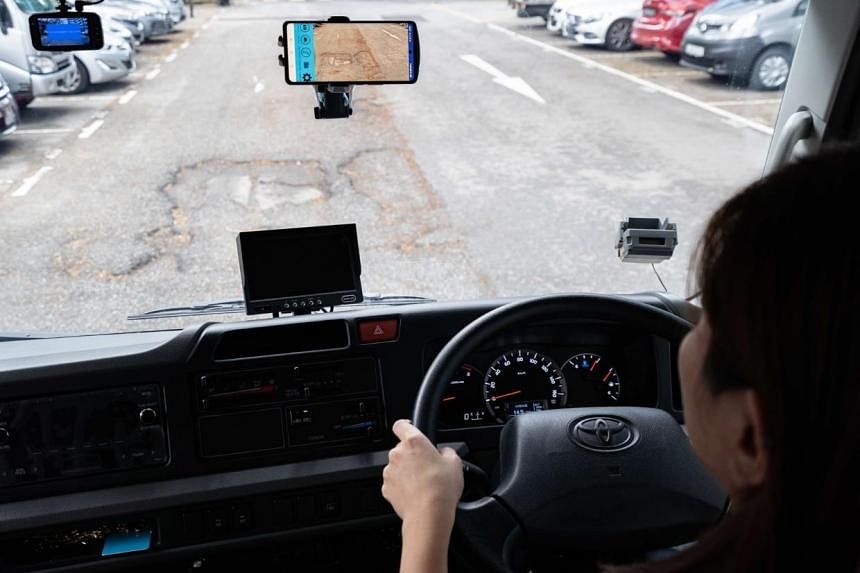SINGAPORE - Two days. That is how long an inspection to find road defects and other road hazards in industrial estates here can take, with facility managers often waiting even longer for a report, so they can fix the problem.
But with the use of smartphones and artificial intelligence (AI) smarts, the process now takes just over an hour at one-north, where JTC Corporation has adopted a new system to help inspectors spot, report and rectify potholes, cracks and other issues quicker and more accurately.
In a statement on Monday, JTC said the solution it developed with Vebits AI, a local start-up, also helps to save costs and makes inspections safer.
JTC later told The Straits Times that it plans to implement the solution in all of its estates in the next two years, where it is technically and commercially feasible, starting with properties in western, eastern and central Singapore.
“The new solution developed raises the bar on estate inspections – leading to safer, more enjoyable estates for our customers and partners,” said Mr Tan Chee Kiat, JTC’s group director for engineering.
The new AI-driven system came about as a result of an innovation challenge that JTC organised in 2020 to address the shortcomings of traditional estate inspection methods.
Vebits AI and Vulcan AI, another Singapore start-up, came up trumps out of a total of 12 submissions from both local and overseas companies as they had the greatest potential for commercialisation, JTC said.
The solution developed by Vebits AI was trialled in Tuas before it was implemented in one-north in November 2022 – a first for JTC.
Meanwhile, Vulcan AI’s solution is currently being tested in industrial estates in eastern Singapore, including Changi Business Park, Changi South, Changi North and Loyang, JTC added.
The government agency said estate defect inspections are traditionally labour-intensive and time-consuming. They are conducted at least once a week by contracted facility management companies.
Two inspectors are needed each time, one to drive the inspection vehicle and another to spot infrastructural issues that pose a safety risk to road users within the industrial estate.
Depending on the size of the estate, the process of marking out defects, taking photographs and churning out a report for rectification works could take a few days to a couple of months, JTC said.
It also highlighted safety concerns and time constraints that come with the traditional method, as these inspections have to be done during off-peak hours when vehicular traffic is lighter and inspectors have to alight from their vehicles and walk to visually investigate and document the defects that are identified.
With the new AI system, a smartphone with a high-definition camera is mounted in the inspection vehicle, which is driven at a normal speed around the estate.
The video captured is then processed using AI to identify defects, grade them based by severity, and highlight those in need of repair.
More than 10 common estate defects can be automatically detected, including those normally missed out by manual inspections such as slanted lamp posts, damaged traffic signs and broken manholes, JTC said.
After the drive-through, estate inspectors can verify the defects highlighted by the AI system and instantaneously generate a report for facility managers to act on.
Dr Marcus Chen, founder of Vebits AI, said: “The extensive training of the AI models allows for a high accuracy rate of 90 per cent to be achieved for estate inspections at one-north.”
The firm’s system can operate in low-light conditions, which means that inspections can be conducted at night as well, he added. The system can also tap multiple sources of information, such as map data and satellite imagery, to provide an overview of the industrial estate’s overall condition.
“This solution opens new possibilities and opportunities for us to serve other inspection service companies in the construction industry,” Dr Chen added.
JTC’s use of AI is the latest effort by public agencies here to improve road safety and road maintenance processes.
Since early 2021, the Land Transport Authority (LTA) has also been trialling the use of AI and video analytics to better pick up defects along the more than 9,000km of roads.
Currently, expressways are inspected weekly, major roads fortnightly and all other roads every eight weeks. Video analytics cuts the time and manpower needed for these inspections, though further tests are needed to ensure accuracy, LTA said previously.
The authority has also trialled technology that saves time on the inspections it conducts for footpaths, cycling paths, bus stops and covered linkways.
A low-cost solution for road contractors to conduct real-time quality inspections on localised road repairs was another project supported by LTA and Enterprise Singapore that was featured during Land Transport Industry Day in 2021.


